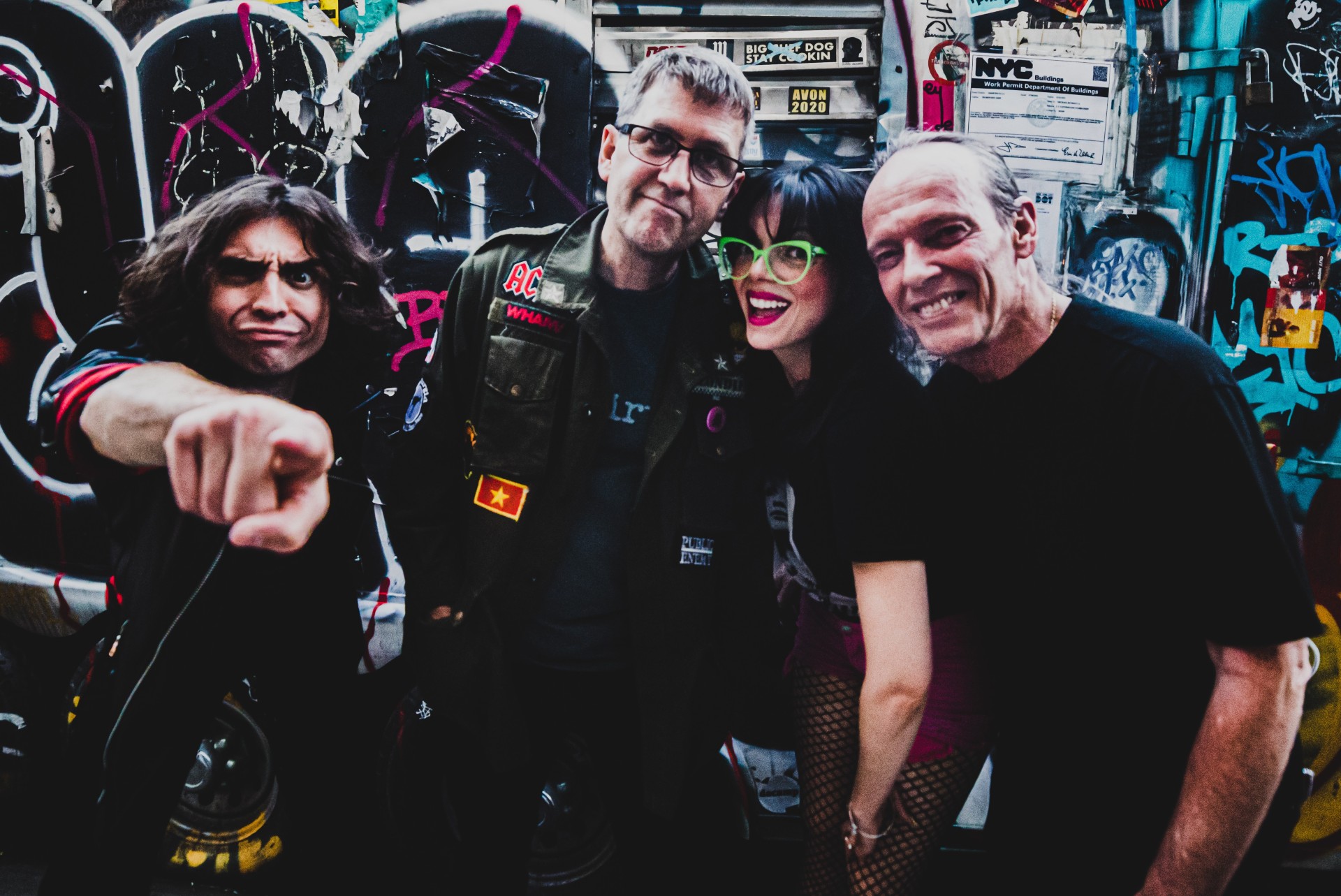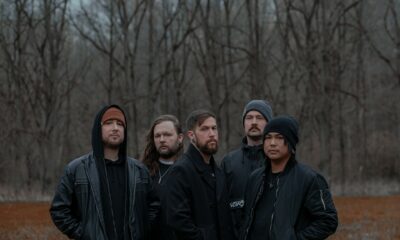Interviews
Sabaton’s Joakim Brodén on ‘The War to End All Wars’ and Surviving High School [w/ Audio]
Sabaton vocalist Joakim Brodén speaks with Mike Bax about many a thing, including the band’s tenth studio album, ‘The War to End All Wars’ (Nuclear Blast Records).
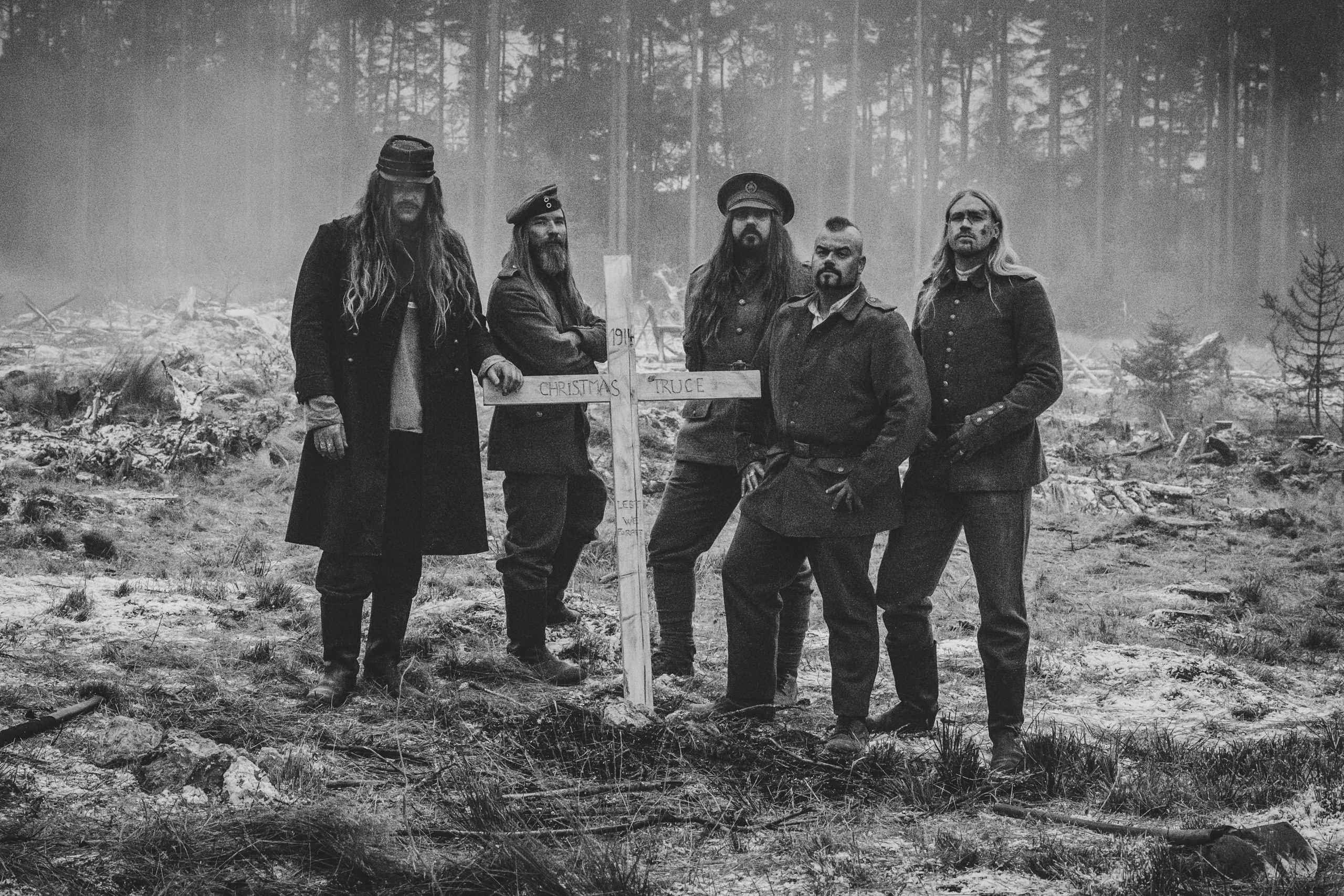
The War to End All Wars, Sabaton’s TENTH studio album, saw release on Nuclear Blast Records last week. Together, Joakim Brodén (vocals), Pär Sundström (bass), Chris Rörland (guitar), Tommy Johansson (guitar), and Hannes Van Dahl (drums) have crafted another masterful journey into our history of combat. This album primarily focuses on World War I, and over eleven tracks, we get treated to a wealth of sing-along anthems touching on numerous battle-ridden tales.
With blistering riffs, menacing drums, and Brodén’s heavy baritone vocals, all eleven songs on The War to End All Wars thrills listeners to these true-life stories;
“Sarajevo” – the assassination of Archduke Franz Ferdinand of Austria that prompted the start of WW1;
“Lady of the Dark” – Milunka Savić, the Serbian woman who took her brother’s place in the army and, disguised as a man, became one of most decorated soldiers of the war;
“The Unkillable Soldier” – the story of the “indestructible” Sir Adrian Carton De Wiart, who survived gunshots to his left eye, skull, hip, leg, stomach, ankle, and ear, and numerous plane crashes, yet kept fighting;
“Hellfighters” – dedicated to the famous 369th regiment made up primarily of African American and Puerto Rican soldiers;
And the poignant “Christmas Truce,” when, on Christmas Eve, 1914, British and German found a moment of peace and reconciliation on a bloody battlefield.
Sabaton refuses to fit into a genre. They are a metal band, to be sure, but their approach to their albums differs from most of their compatriots. Fans need only know them as Sabaton, the heavy metal band that sings of real-life wars and the people who played a part in them. Their anthems tell of gruelling campaigns and dazzling acts of bravery, magnificent victories, and touching personal struggles, true stories more fantastic than any fiction.
Our heartfelt thanks to Joakim for taking a healthy chunk out of his afternoon a few weeks ago to field a few questions for V13 via phone. The audio is available here if you’d prefer to hear his answers in real-time.
I feel like Sabaton might approach their music a little bit differently than most other bands, given that you reach back into history and you try and tell stories through your music. Can you talk a bit about that process?
Joakim Brodén: “Yeah, it’s hard to say. It can be done in several ways. But we don’t have a single method of working. In most cases, we have the music come before the lyrics, but not necessarily before we know the topic we’re dealing with. Sometimes, it can be as easy as; we like to write music. And two years before we even knew we were going to make an album, we sat down either together or alone, and we wrote a piece of music because we wanted to, and it ended up on an album.
“In most cases, we know about the theme we are working on, possibly even the person or conflict we are dealing with, but maybe no lyrics at the time. Sometimes they come at the same time as the song. The lyrics are usually added after but can be at the same time. We’ve never written lyrics and then put music to them.”
Wow, I’m surprised by that, given that you are trying to sing about factual events. I would almost feel like you would have a meeting and say, ‘alright, we want to do the second world war and maybe these two factions,’ and then you’ve got to go and research it and put lyrics to it.
“Yeah, that is exactly right, but we usually have the song music or are in the middle of the songwriting process at this time. So we are researching and writing music at the same time. For instance, I knew that the song ‘Christmas Truce’ was about THE Christmas Truce; I knew emotionally what music I wanted to put in there. I had no lyrics at that point. But that said, I usually do mock-ups with a piano and random lyrics. Some of those random lyrics stayed. For example, (sings) ‘And today we’re all brothers, Tonight we’re all friends, A moment of peace in a war that never ends;’ that came while writing the song. Everything else was sort of pulled together after.”
So is that all on you? Are you writing all of the lyrics? Or are you working on that with the four other members?
“That’s me and Pär doing the lyrics and the historical concepts. Everybody in the band is into history, to some degree. But me and Pär are the ones who would probably qualify as nerds (chuckles).”
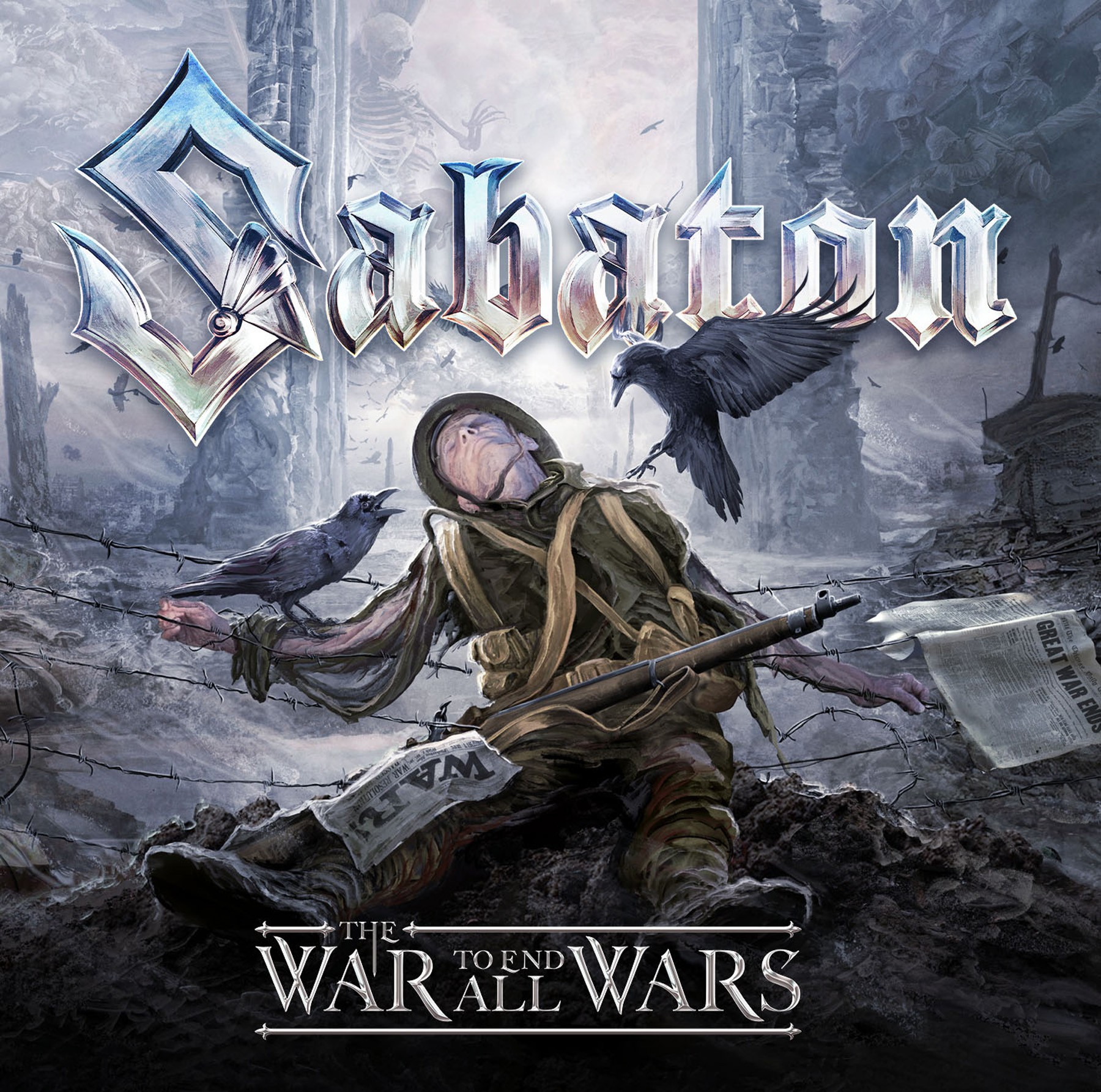
Artwork for the album ‘The War to End All Wars’ by Sabaton
And that leads right into my next question; are you guys all history nerds? Is this stuff you were into and doing prior to becoming a band and making music based on historical events.
“My interest in history has actually grown with the band. On our first album, at a certain point, we had the music to a song that eventually became ‘Primo Victoria.’ We thought, ‘we can’t sing about beer, babes or motorcycles; rock n’ roll topics, so we thought let’s try a song about D-Day. And all of a sudden, writing lyrics wasn’t a necessary evil anymore. All of a sudden it was interesting for us. So we thought making an album about military history was a good idea. That was 2004, and we are still doing it.”
Have you all broached the idea of making a fictional battle scenario or some kind of war in the future and making an album about that?
“It would be cool. We have toyed with the idea. I don’t know if it is ever going to happen. It has to be treated with care, obviously. Somebody is going to be the bad guy in our realistic events, you know? We don’t want to piss people off that much by saying who is going to start World War III or stuff like that. Or try and predict it. But we have discussed it and toyed with the idea. We have considered talking to some authors about writing the synopsis. We are creative people, but I’m not sure if we could come up with the ideas of a fictional conflict. We could write about a fictitious conflict if somebody wrote of the conflict so that we could read it.
I was sad to see the Canadian Judas Priest tour with you guys on it failed to materialize after it was moved. Is there any inclination as to what touring in North America will look like in 2022-2023 now?
“We’re looking into it. The trick now is most people are reasonably confident that we are seeing the end of restrictions for concerts. Maybe not in every country or territory at the time, but people can see the light at the end of the tunnel, even promoters. Now the trick is there are thousands and thousands of bands, not only metal, that want access to the venues. It is our main priority now. We are done with the album. We recorded a bunch of extra songs even before that, extra singles. We are done with the studios. We want to get back on the road again. If it was a normal situation, I could probably give you a hint on when we are looking at coming over, but at this point, it is a bit of madness.
We’re still seeing it here. Canada is very much now at the endgame of lockdown. They are talking like at the end of March is when they will open things up again. But it’s still pretty suppressed here.
“Ok. Sweden has been pretty open for most of the time except for a month or two here and there. Other than that, it’s been ‘do whatever you want.’ There are still restrictions to concerts and stuff like that, of course. But people are living their daily lives, going shopping and going out to have a beer with friends. Ninety-five percent of the time, we’ve been able to do that.”
I’m toying with going to my first concert since March of 2020 this weekend.
“Oh, ok, cool! You must be looking forward to it.”
Very much so. I’ve got to cross the border to do it, and I’m a little nervous about that because I know that I can get over the border, but I don’t know that I can get back.
“I don’t think they can stop you from coming back. If you are a citizen of Canada, don’t worry about it. There might be some trouble coming back with quarantines or whatever. But technically, I don’t think they can stop you as you are a citizen.”
Yeah. I know. Can you talk a bit about what you were like in high school? Were you academic? Were you into history? Were you into music at an early age?
“I was into music at an early age, but I was mostly trouble (laughs). But I was not too bad. I’ve never used this vocabulary in English before. When I am talking about music, I use the same descriptors daily. I was more like this; I could cause trouble, I would disturb the peace in class. I could cause trouble, like pranks and stupid shit, but I would never destroy stuff on purpose. I would never hurt people. I was never a violent bully or anything like that. Sitting still and doing what I was told wasn’t really in my DNA (laughs), I was playing music already at an early age. I did like history already, but I did not like how it was taught.
“I think this is common in most countries when you are talking about history where you are looking at everything and trying to create a balanced human being who can live in society later on. So you have to know a little about where we come from and the history, which makes it boring because everything is so zoomed out. You are talking about World War I, or World War II, or similar wars where it is different for every country being taught. It is all so zoomed out with dates that can easily and very fast become boring. Instead of zooming in because history, when zoomed out, can get boring but zooming in on the stories, everybody likes a story. History is nothing but stories. So if you zoomed in on a really fantastic piece of history and people from World War I or World War II; any conflict; something fantastic that they did. Then to a kid, you can learn why that individual was in a war because of this story, and that can get them hooked. They will want to know the circumstances and why, and then you can zoom out.
“I think starting on these stories more quickly and then zooming out would be a better way of doing it. For me, at least, that worked much better when my interest got started. For me, I was losing interest so quickly. If I had found a good story to pull me in, I would have found it was more interesting to me. History is cool.”
Over here in North America and here in Canada in particular, it’s hard to see Sabaton and see the full stage production. I have seen the tank, but I haven’t seen what you might bring to, say, Sabaton Open Air. Or some of your dates over in Europe.
Can you talk a bit about the differences between what a Sabaton show looks like in North America and in Europe and the logistics of putting those shows on?
“We are trying to put as much as possible into the North American concerts. But if we, on a good day, we do 3,000 to 4,000 capacity as a headliner in North America. We do 20,000 in Europe. That’s on a much bigger stage. Pyros are treated very differently in North America. The laws, rules, and regulations around what can be used. This can become an issue with everything being programmed, of course, for the pyros and whatnot.
“It’s also interesting because it keeps us on our toes; ‘How can we do our shows with half the stage size? Or a quarter of the stage size?’ And then still make an impressive show? Of course, the dream and goal is to bring equal production wherever we go. On the other hand, I know what that is too when you have been on a long tour, and with the same people and the same production every night. That can become a bit repetitive doing the same thing every night. That is one reason why I got into heavy metal; I didn’t want to do the same thing day after day.”
I don’t think a lot of people think about the repetition that is involved with music and what it really means to go out on tour and service an album. To do 150 shows over the course of a year. It’s very repetitive.
“Yeah, but what keeps me sane is the crowd. The venues and the crowd. Sometimes we are in Wacken, where there are two stages and 80,000 people, and we can be in Australia, and it’s 1,800 people. Totally different settings. The crowds help a lot. I’m not bashing any other musicians here; we all like different things in life, but for me standing there in my oeuvre trying to look cool and not interacting with the crowd would be insanely boring because that is what’s different. I’ve played ‘Swedish Pagans’ and ‘Primo Victoria’ before thousands of times, that is not going to be the main part.
“I’m not worried about seeing everybody in the band playing everything exactly perfectly. It should be a competent show, but we should make sure we are also having fun so that we still want to do this five years from now. We should also make sure that we are having fun with the audience entertaining them, and maybe messing around a bit doing stupid shit. Sometimes if somebody has been playing too well on their guitar solo and being a bit too cocky, maybe I will try and twist his nipple during the next verse, you know (laughs)?”
To me, Sabaton is a physical show. You guys are active. You certainly are moving around a lot. Is there a regiment you have to do prior to doing a show? Are you stretching? Do you do yoga? What are you doing to keep in shape and keep active?
“Well, I certainly eat and drink too much. And when I am not doing that, and when I am not doing shows, I put on weight. I’ve found that out the hard way now. It turns out I burn quite a lot of calories on stage. I don’t really sit still. When I am in the studio writing music and recording, that’s when I sit still too much. I like to move around. Walks in nature. Winters in Scandinavia, I like cross country skiing. Stuff like that I really enjoy.
“Physically before a show, if I haven’t done a show in a long time, maybe I will do some vocal warm-ups. Usually, it’s just physical. I wake up all of the musculatures that I need to sing, but also it’s not a workout like 30 minutes, but for ten minutes, it could be crunches, some push-ups, just something to pump up before the show. Sometimes I’ll be sitting in the backstage area, and I’m really tired and feeling ‘bleh.’ And then just getting into stage clothes and starting to break a little bit of sweat gets you pumped up for the show as well.”
Can you talk a little about putting the War To End All Wars together during the pandemic? What was different for you aside from the external pandemic. Did it present any challenges as far as getting together in the studio? Mastering the album? That sort of thing?
“That’s the weirdest thing. The pandemic messed everything up except that. That was 95 percent like nothing had really changed, you know? It’s still going to be me alone or me with a band member writing music. As Scandinavians, we had some quarantine things, but we could still do it, you know? We just had to plan a bit, our travels, you know?
“The recording itself was no problem at all. It would be the producer, me, and the drummer first, and then we’d bring in the next guy, and for the lyrics, me and Pär were writing most of the lyrics face to face pretty much as we are sitting now. We’d have a Dropbox or a Google Drive, and we can share videos, snippets, and links to each other’s stuff when writing lyrics. It’s weird; it changed everything, but the process for us, the way we make albums at least, was nothing. The only thing I can think of is that I wasn’t there when the female and male quire vocals were recorded. For one of them, it wasn’t even because of the pandemic; it was because I was in Serbia recording a music video (laughs.)”
Can you talk a bit about what your fanbase is like? Is it prominently male? Are they into the stories more so than the music or the music more than the stories? Have you guys talked about that?
“This would have been so much easier to answer a bunch of years ago. Trust me; this makes me happy; these days, we see more and more people where we think, ‘How did you get into Sabaton?’ We see less and less of the stereotypical metalhead. Not that I have anything against that, it’s just good to see that it is not only the stereotypical metalhead who listens to Sabaton. Still a majority of males. But way more women than most of our colleagues have. Younger than we think sometimes, but that is really also dependent on country.
“In North America, we are more of an underground band than in Europe. So this is people who are more into the metal scene. People have already chosen to be in the metal scene, mostly in America. But in Europe, many people stumbled into us through gaming and YouTube or a friend, and they just went to one of our major European festivals to have fun, and they saw us there, and they aren’t really metalheads at all. Or they are not into our style of metal at all normally. So it’s kind of cool, actually. We never know what to expect.”
In doing my research for this interview, I didn’t know anything about Milunka Savić before doing this and, of course, read a bunch of history on her. How did you find out about her? Was that something you all knew about, or were you steered to that?
“No, that’s the beauty of it. Sometimes our fans give us books or weblinks or stuff like that. It’s such a huge advantage. If you would have asked me two years ago ‘Milunka Savic, what can you tell me about her?’ I wouldn’t have had an answer, you know? That’s something I’m really happy about, and we can be proud of because it’s not of our doing.
“When hanging out with other musicians, sometimes we’ve found out that they don’t like hanging out with random fans. I understand this; they don’t want to be interrogated about the band repeatedly. I understand that people can crowd you all of the time, and that’s not too nice. But if I’m sitting in a bar and I’m having a beer and somebody comes up and wants to talk about Sabaton, I can quickly change the direction of the conversation from how is it like backstage? or what did you do when you toured with the Scorpions in 2011? But then steer it onto military history because that’s usually a common thing. And that’s where we can really have a two-way conversation, and I can learn. Especially going over to North America, there are a lot of people who had family members who spent time in service and stuff like that. We are really happy about it in that sense. Funny, but really lucky as a bonus.”
-

 Music5 days ago
Music5 days agoTake That (w/ Olly Murs) Kick Off Four-Night Leeds Stint with Hit-Laden Spectacular [Photos]
-

 Alternative/Rock7 days ago
Alternative/Rock7 days agoThe V13 Fix #010 w/ High on Fire, NOFX, My Dying Bride and more
-

 Alternative/Rock2 weeks ago
Alternative/Rock2 weeks agoA Rejuvenated Dream State are ‘Still Dreaming’ as They Bounce Into Manchester YES [Photos]
-

 Features5 days ago
Features5 days agoTour Diary: Gen & The Degenerates Party Their Way Across America
-

 Culture1 week ago
Culture1 week agoDan Carter & George Miller Chat Foodinati Live, Heavy Metal Charities and Pre-Gig Meals
-

 Music1 week ago
Music1 week agoReclusive Producer Stumbleine Premieres Beat-Driven New Single “Cinderhaze”
-

 Alternative/Rock1 week ago
Alternative/Rock1 week agoThree Lefts and a Right Premiere Their Guitar-Driven Single “Lovulator”
-
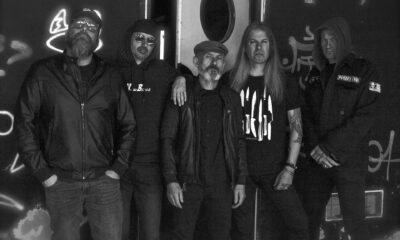
 Alternative/Rock1 week ago
Alternative/Rock1 week agoDeath Wishlist Are Fiery and Fierce with Their “I Get Bored” Video Premiere







